SUMMARY OF FINDINGS
OVERVIEW
This publication contains statistics on the composition and distribution of earnings and hours paid for, of employees, as well as information on how employees' pay is set - by award only, collective agreement or individual arrangement. The statistics are based on the Survey of Employee Earnings and Hours (EEH) conducted in respect of May 2006.
The diagram below shows the proportion of employees in scope of the May 2006 EEH survey by category of employee.
CHANGE TO MEASURE OF EMPLOYEE EARNINGS
The measure of employee earnings for estimates in this publication is regular wages and salaries in cash (including amounts salary sacrificed), that is, cash earnings. For further information see paragraphs 4 and 5 of the Explanatory Notes.
COMPOSITION AND DISTRIBUTION OF EARNINGS AND HOURS
Composition: In May 2006, average weekly total cash earnings was $852.30 for all employees, $1,020.30 for male employees and $677.80 for female employees. Average weekly total cash earnings was $1,102.00 for full-time adult employees and $410.80 for all part-time employees. Overtime payments accounted for 3.9% of average weekly total cash earnings of all employees and 5.4% of average weekly total cash earnings of full-time non-managerial employees.
AVERAGE WEEKLY TOTAL CASH EARNINGS(a), May 2006
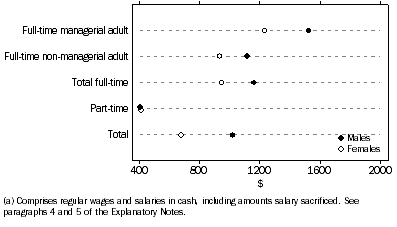
Salary sacrifice: For those employees with a salary sacrifice arrangement, the average amount salary sacrificed was $212.70, or 15.8% of average weekly total cash earnings. Of these employees, full-time managerial adults salary sacrificed, on average, 17.4% of average weekly total cash earnings, compared with 14.2% for full-time non-managerial adult employees and 23.5% for all part-time employees. The average amount salary sacrificed across all employees was $29.80, or 3.5% of average weekly total cash earnings.
AMOUNTS SALARY SACRIFICED |
|  |
 |  | Employees with a salary sacrifice arrangement | All employees |  |
 |  |
|
|  |
 |  | Proportion of
employees who
salary sacrifice | Average
weekly
total cash
earnings(a) | Amounts
salary
sacrificed | Proportion
salary
sacrificed(b) | Average
weekly
total cash
earnings(a) | Amounts
salary
sacrificed | Proportion
salary
sacrificed(b) |  |
 |  | % | $ | $ | % | $ | $ | % |  |
|  |
| Full-time managerial adult |  |  |  |  |  |  |  |
 | Males | 23.8 | 2 138.10 | 368.40 | 17.2 | 1 523.30 | 87.70 | 5.8 |  |
 | Females | 17.7 | 1 657.30 | 302.10 | 18.2 | 1 233.50 | 53.30 | 4.3 |  |
 | Persons | 22.3 | 2 043.60 | 355.40 | 17.4 | 1 451.40 | 79.20 | 5.5 |  |
| Full-time non-managerial adult |  |  |  |  |  |  |  |
 |  |  |  |  |  |  |
 | Males | 17.2 | 1 484.10 | 198.30 | 13.4 | 1 116.50 | 34.10 | 3.1 |  |
 | Females | 17.9 | 1 148.40 | 181.10 | 15.8 | 933.60 | 32.50 | 3.5 |  |
 | Persons | 17.5 | 1 349.70 | 191.40 | 14.2 | 1 045.00 | 33.50 | 3.2 |  |
| Part-time |  |  |  |  |  |  |  |  |
 |  |  |  |  |  |  |  |
 |  |  |  |  |  |  |  |
 | Males | 3.9 | 978.30 | 213.30 | 21.8 | 404.90 | 8.20 | 2.0 |  |
 | Females | 8.2 | 730.40 | 174.30 | 23.9 | 413.10 | 14.20 | 3.4 |  |
 | Persons | 7.0 | 769.00 | 180.40 | 23.5 | 410.80 | 12.60 | 3.1 |  |
| All employees |  |  |  |  |  |  |  |  |
 |  |  |  |  |  |  |  |
 |  |  |  |  |  |  |  |
 | Males | 15.2 | 1 593.70 | 234.00 | 14.7 | 1 020.30 | 35.50 | 3.5 |  |
 | Females | 12.8 | 1 044.90 | 186.30 | 17.8 | 677.80 | 23.80 | 3.5 |  |
 | Persons | 14.0 | 1 348.20 | 212.70 | 15.8 | 852.30 | 29.80 | 3.5 |  |
|  |
| (a) Comprises regular wages and salaries in cash, including amounts salary sacrificed. See paragraphs 4 and 5 of the Explanatory Notes. |
| (b) Amounts salary sacrificed as a proportion of average weekly total cash earnings. |
Sector: Average weekly total cash earnings of employees in the public sector was higher than for the private sector, in all managerial and non-managerial employee categories.
Industry: Average weekly total cash earnings of all employees was highest in the Mining industry ($1,738.00) and lowest in the Accommodation, cafes and restaurants ($485.00) and Retail trade ($497.40) industries.
Occupation: Among major occupation groups, Managers had the highest average weekly total cash earnings ($1,488.50) while Sales workers had the lowest ($483.80).
States and territories: The average weekly total cash earnings of all employees was highest in the Australian Capital Territory ($965.40) and lowest in Tasmania ($743.70).
FULL-TIME NON-MANAGERIAL ADULT EMPLOYEES
In May 2006, average weekly total cash earnings was $1,045.00 for all full-time non-managerial adult employees ($1,116.50 for male employees and $933.60 for female employees). For this category of employee, average weekly total hours paid for was 39.7 hours (40.6 hours for males, 38.2 hours for females). The average hourly earnings for all full-time non-managerial adult employees was $26.30.
Sector: Average weekly total hours paid for was higher in the private sector (40.2) than in the public sector (37.9). In contrast, average hourly total cash earnings was higher in the public sector compared with the private sector ($30.60 and $25.10 respectively).
Industry: Average weekly total hours paid for was highest in the Mining industry (45.5 hours) for all full-time non-managerial adult employees and lowest in the Education (36.2 hours) and Government administration and defence (37.6 hours) industries. The Mining industry also had the highest average hourly earnings ($37.50) for full-time non-managerial adult employees while the lowest was in the Accommodation, cafes and restaurants ($19.20) and Retail trade ($19.60) industries.
AVERAGE WEEKLY TOTAL CASH EARNINGS(a), Industry - Full-time non-managerial adult employees
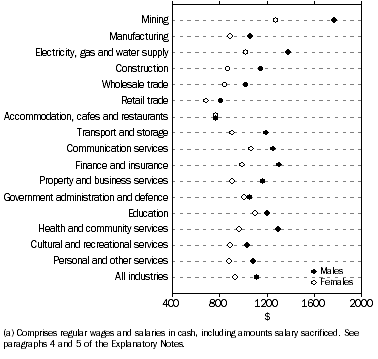
Occupation: Among the major occupation groups, Machinery operators and drivers had the highest average weekly total hours paid for (44.0 hours), and Professionals had the lowest average weekly total hours paid for (37.8 hours). The ratio of female to male average weekly total cash earnings for full-time non-managerial adult employees was highest for Sales workers (84.4%) and lowest for Technicians and trades workers (75.6%) and Machinery operators and drivers (76.0%).
Average weekly total cash earnings(a), Occupation - Full-time non-managerial adult employees
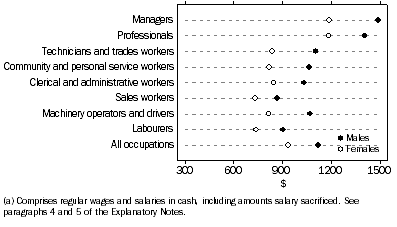
States and territories: Average weekly total cash earnings for full-time non-managerial adult employees was highest in Western Australia ($1,166.30) and lowest in Tasmania ($940.30). For this group of employees, the average weekly total hours paid for was highest in Western Australia (41.2 hours - 39.1 ordinary time hours and 2.1 overtime hours), and lowest in the Australian Capital Territory (38.3 hours - 37.5 ordinary time hours and 0.8 overtime hours).
PAY SETTING METHODS
Information on the methods of setting pay for employees refers to how the main part of an employee's pay was set in the survey reference period. Employees classified to 'award only' had their rate of pay specified by an award and were not paid more than that rate of pay. Employees classified to the collective agreement category had the main part of their pay set by a registered or unregistered collective agreement, or an enterprise award.
Those in the individual arrangement category include employees who had the main part of their pay set by an individual contract, registered individual agreement (e.g. Australian Workplace Agreement), common law contract, or an agreement to receive overaward payments. Working proprietors of incorporated businesses are also included in the individual arrangement category.
All employees
The most common methods of setting pay for all employees were registered collective agreement (38.1%), unregistered individual arrangement (31.7%) and award only (19.0%). Registered individual agreement (3.1%) and unregistered collective agreement (3.0%) were the least common methods of setting pay. The remaining 5.1% of employees were working proprietors of incorporated businesses.
Methods of setting pay, Males, Females, Persons
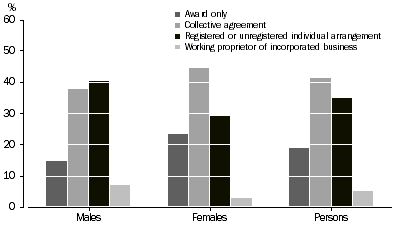
In the private sector, the most common method of setting pay was unregistered individual arrangement (39.0%), while in the public sector it was registered collective agreement (92.9%).
The most common methods of setting pay for full-time employees were registered or unregistered individual arrangement (41.4%) and collective agreement (40.5%). For part-time employees, collective agreement (42.5%) and award only (32.8%) were the most common methods of setting pay.
For permanent or fixed term employees, the most common method of setting pay was collective agreement (43.7%) while for casual employees, the most common method of setting pay was by award only (43.5%).
The award only method of setting pay for employees was highest in the Accommodation, cafes and restaurant industry (57.2%). The collective agreement method was highest in the Government administration and defence industry (91.8%), and the individual arrangement method (registered or unregistered) was highest in the Wholesale trade industry (71.1%).
Among the major occupation groups, the award only method of setting pay was highest for Community and personal service workers and Sales workers (39.2% and 32.4% respectively). The collective agreement method was highest for Professionals (56.1%) and the individual arrangement method (registered or unregistered) was highest for Managers (53.7%).
Tasmania and New South Wales had the highest proportion of employees whose pay was set by award only (23.2% and 22.9% respectively). The Australian Capital Territory had the highest proportion of employees whose pay was set by collective agreement (57.0%). Western Australia had the highest proportion of employees whose pay was set by individual arrangement (registered or unregistered) (44.0%).
Jurisdiction
The jurisdiction of a registered collective or individual agreement is based on the federal or state industrial tribunal or authority which has certified, approved or registered the agreement. Thus an employee may be covered by either a federal or state registered agreement (individual or collective) depending on the circumstances that prevail in the workplace. Estimates have been compiled based on the workplace relations environment prior to the introduction of the Workplace Relations Amendment (Work Choices) Act 2005.
At the Australian level, 29.2% of all employees had their pay set by federal registered agreement. This compares with 12.0% of employees who had their pay set by state registered agreement. The Australian Capital Territory (61.8%) had the highest proportion of employees who had their pay set by federal registered agreement, while New South Wales (19.4%) and Queensland (21.5%) had the lowest.
Tasmania (21.5%) and Queensland (20.5%) had the highest proportion of employees who had their pay set by state registered collective agreement, while Western Australia (12.8%) and New South Wales (15.3%) had the lowest.
Weekly total cash earnings
The average weekly total cash earnings for full-time non-managerial adult employees who had their pay set by award only was $767.30. This compares to average weekly total cash earnings of $1,103.30 for full-time non-managerial adult employees who had their pay set by a collective agreement and $1,061.60 for full-time non-managerial adult employees who had their pay set by individual arrangement.
WEEKLY TOTAL CASH EARNINGS(a), Methods of setting pay - Full-time non-managerial adult employees
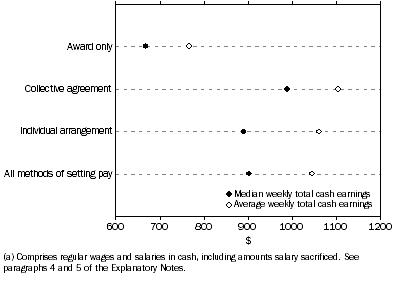
 Print Page
Print Page
 Print All
Print All